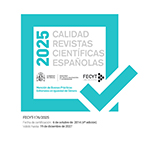La música como modelo de inclusión social en espacios educativos con alumnado gitano e inmigrante
Resumen
Violencia, racismo, xenofobia y absentismo escolar, son algunos de los prejuicios y estereotipos que aparecen entre el alumnado de numerosos centros educativos ubicados en zonas urbanas marginales con mayoría de población inmigrante y gitana. La investigación tiene como objetivo el desarrollo y aplicación de un proyecto de educación intercultural sustentado en la formación musical y avalado por diferentes experiencias realizadas en contextos de similares características. Partimos de la hipótesis de que la formación musical incide muy positivamente en la génesis de actitudes y valores de respeto y tolerancia, como así ha ocurrido en las experiencias aplicadas en Venezuela, Estados Unidos, Reino Unido, Brasil, por poner algunos ejemplos. Metodológicamente se plantea desde una perspectiva cualitativa utilizando el método etnográfico y las técnicas de la entrevista en profundidad y la observación participante. La experiencia ha generado la reducción del absentismo escolar, la superación de prejuicios y estereotipos y ha permitido la construcción de espacios comunes de convivencia e inclusión escolar, favoreciendo complementariamente el éxito escolar de este tipo de alumnado.Descargas
Descarga artículo
Licencia
La Revista Complutense de Educación, para fomentar el intercambio global del conocimiento, facilita el acceso sin restricciones a sus contenidos desde el momento de su publicación en la presente edición electrónica, y por eso es una revista de acceso abierto. Los originales publicados en esta revista son propiedad de la Universidad Complutense de Madrid y es obligatorio citar su procedencia en cualquier reproducción total o parcial. Todos los contenidos se distribuyen bajo una licencia de uso y distribución Creative Commons Reconocimiento 4.0 (CC BY 4.0). Esta circunstancia ha de hacerse constar expresamente de esta forma cuando sea necesario. Puede consultar la versión informativa y el texto legal de la licencia.











